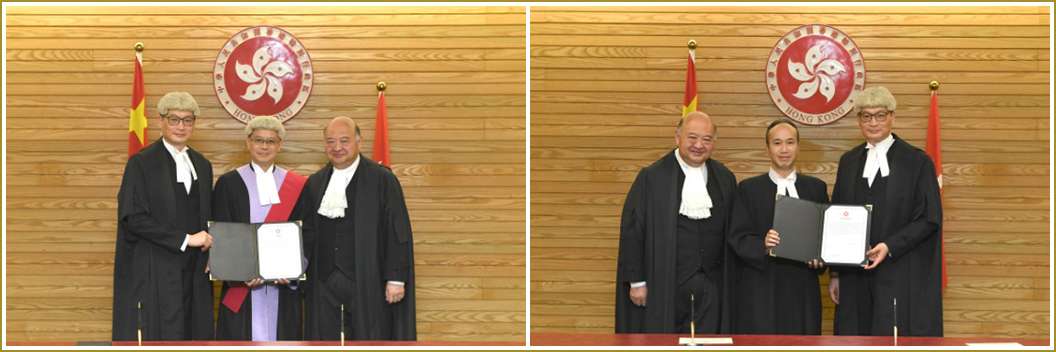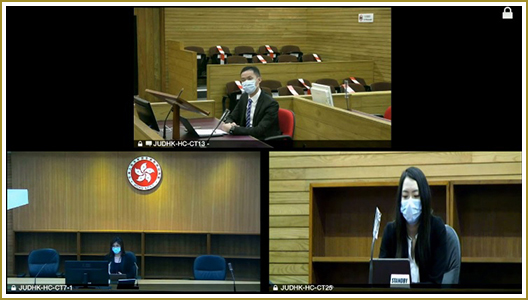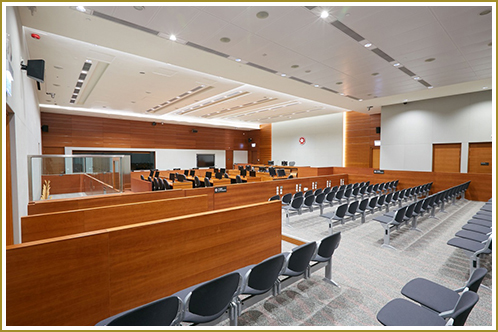Review of 2020

Following tradition, the year began with the Ceremonial Opening of the Legal Year on 13 January. The Hon Chief Justice Geoffrey MA spoke about the importance of understanding how the law operates and is expected to operate in order to embrace the concept of the rule of law, with particular reference to the events that took place in the latter half of 2019. He emphasized that while the Basic Law and the Bill of Rights set out the rights and freedoms of individuals, there are clear limits to the exercise of such so as not to affect adversely to an unacceptable level the enjoyment by others of their rights. Furthermore, he said that the administration of justice has as its central characteristic the requirement of a fair trial. In a criminal case setting, the fairness of a trial means fairness to all sides, both to the prosecution and to the defence, and the court will at all times ensure that a fair trial takes place. The Chief Justice expressed that the proper administration of justice depends on judges discharging the duties and responsibilities incumbent on them. In this regard, judges do not have the duty to achieve a certain result in accordance with popular wishes. Judges look only to the letter of the law and to the spirit of the law, and nothing else.
The Chief Justice mentioned that he would retire upon reaching retirement age in January 2021. He took the opportunity to thank judges, judicial officers and staff in the Judiciary for giving him unwavering support and showing dedication in the face of unprecedented challenges. He also reiterated his commitment to the rule of law and appealed to the community to preserve and treasure it.
►Facing Challenges from COVID-19 epidemic
In 2020, the Judiciary was fraught with unprecedented challenges arising from the COVID-19 epidemic. From 29 January to 3 May 2020, in view of public health considerations, the Judiciary generally adjourned court proceedings (“the General Adjourned Period” (“GAP”)) with the exception of urgent and essential business. In March 2020, the Chief Justice issued a statement to reassure the public that the Judiciary had been doing its best to cope with the disruptions to court operations. He explained that the Judiciary had been urgently exploring further ways to increase court services during the GAP without compromising the health and safety of court users, staff and judges. The Judiciary had also been promoting the greater use of technology as long as it was considered feasible and permissible under the relevant court rules and procedures. Following the GAP in May 2020, we resumed court business in an incremental and orderly manner, while putting in place appropriate social distancing and crowd management measures corresponding to the evolving public health risks. The administration of justice is an essential public service. Having capitalized from the experience of the GAP and the social distancing measures in face of the epidemic, we managed to carry on court business (with adjustments to capacity where necessary) as safely as circumstances permit.
In September 2020, in view of the number of commentaries, opinions and criticisms that had been made in relation to various decisions of the courts and judges, the Chief Justice issued a statement to explain some fundamental principles regarding the administration of justice in Hong Kong, with particular emphasis on criminal cases. The Chief Justice stressed that the constitutional duty of judges, in the exercise of judicial power, was strictly to apply the law and nothing else. Such duty did not involve judges deciding political matters or controversies. It follows that judges must not be influenced by political considerations of whatever nature. The Chief Justice stressed that there are some basic principles in the handling of a criminal case that must also be borne in mind, including the requirement of a fair trial, the presumption of innocence, the requirement that the burden is on the prosecution to prove that an accused committed a crime beyond reasonable doubt before there can be a conviction and the right to an appeal. The Chief Justice affirmed that courts and judges are not above criticism but criticisms must be informed, solidly based and properly made; otherwise it would be detrimental to public confidence in the administration of justice and ultimately to the rule of law in Hong Kong. The Chief Justice also reiterated that there must not be a politicisation of the Judiciary and its functions.
►Enhancing Transparency
In accordance with the principle of open justice, all court hearings, save for some very limited exceptions (e.g. involving children), are open to the public. Judgments, reasons for verdict and reasons for sentence for District Court and above are also available on the Judiciary website. All this ensures transparency.
In 2020, the Judiciary announced additional transparency measures to enhance public understanding about its operations.
Starting from October 2020, summaries of selected decisions in the District Court and Magistrates' Courts which are of public interest were uploaded onto the Judiciary website as far as practicable.
Separately, as from July 2020, as far as complaints against judicial conduct are concerned, where there are a large number of identical or similar complaints, the Secretariat for Complaints against Judicial Conduct will post on the Judiciary website the substance of the complaints, the outcome of investigations together with the underlying reasons.

►Appointment of Judges and Judicial Officers

Various judicial appointments were made in the year 2020. These include the appointment of the Hon Mr Justice Andrew CHEUNG as the next Chief Justice with effect from 11 January 2021; the appointment of the Right Hon Lord Patrick HODGE as a Non-Permanent Judge from another common law jurisdiction of the Court of Final Appeal with effect from 1 January 2021; the appointment of His Honour Judge Justin KO as the Chief District Judge; and the appointment of Mr SO Wai-tak as the Chief Magistrate, both with effect from 6 January 2020.
►Appointment of Judiciary Administrator
Ms Esther LEUNG has been appointed to the post of Judiciary Administrator with effect from 20 July 2020. She succeeded Miss Emma LAU, who proceeded on pre-retirement leave on 16 July 2020.
►Greater Use of Information Technology (“IT”)
During the GAP when physical attendance in court premises and contact were minimized, and gathering of crowds avoided, the Judiciary took a proactive approach in making greater use of IT to support and facilitate the conduct of court business.
The Judiciary has been developing by phases an integrated court case management system (“iCMS”) across all levels of court to enable the electronic handling of court-related documents and payments. The passing of the Court Proceedings (Electronic Technology) Ordinance in July 2020 will further facilitate this. We will therefore be able to continue to improve the efficiency of litigation and reduce the use of paper. Subject to the enactment of some further subsidiary legislation, the iCMS will first be implemented at the District Court and part of the Magistrates’ Courts. This will subsequently be extended to other levels of court.
With support from the legal profession and relevant stakeholders, the Judiciary has already introduced administrative measures to enable the handling of certain documents by electronic means while at the same time ensuring security in the use of information technology. These include the creation of special email accounts to enable parties to lodge documents to the court electronically for paper disposal and the extension of the existing electronic submission platform in the District Court to the High Court, the Family Court and the Lands Tribunal.
The Judiciary made greater use of remote hearings for suitable civil cases, using video-conferencing facilities (“VCF”) and also having hearings conducted by phone. Two guidance notes were issued in April and June 2020 setting out the practice and arrangements for conducting remote hearings in civil proceedings (including trials) in the High Court, Competition Tribunal, District Court and Family Court. A cost-effective technical option involving VCF software was made available to court users in mid-June 2020. In December 2020, an additional guidance note was issued to set out further guidance for the practice for remote hearings in civil cases, including extending the use of VCF to the Labour Tribunal and Small Claims Tribunal, as well as introducing the use of a “browser-based” VCF option from 2 January 2021. The latter provided a low-cost option whereby court users would only need a normal computer (not a mobile device) with a camera function, etc. to connect to the court for VCF hearings. This new option would greatly expand the number of court hearings which can be conducted remotely. It would also facilitate the use of VCF facilities by litigants-in-person (LIPs). The Judiciary has also been planning to introduce legislative changes to enable remote hearings to take place in criminal cases.

►Caseload

In 2020, the GAP and the subsequent resumption of court business with reduced capacity and social distancing measures affected court proceedings and court business. Owing to the need to refix hearings, the average court waiting times in some levels of court inevitably lengthened. There was a reduction of approximately 25% in a few case types owing to the GAP, but the reduction in others was less significant.
Following the implementation of contingency and social distancing measures in light of the changing public health situation, the overall capacity of the courts was inevitably reduced, thus affecting court proceedings and court business. That said, efforts were made to handle as many cases as possible through flexible use of court premises, dealing with cases remotely or making determinations on the papers. Meanwhile, to address the heavy work pressure at all levels of court, the Judiciary launched a new round of recruitment exercises for judges and judicial officers starting at the end 2020. The Judiciary also continued to make use of temporary judicial resources to help maintain judicial manpower as and when required at different levels of court.
In addition to the passing of the Court Proceedings (Electronic Technology) Ordinance, legislative amendments to the High Court Ordinance (Cap. 4) to streamline procedures of the High Court were also passed. The amendments will facilitate a more efficient processing of cases, including particularly the increasing number of judicial review involving non-refoulement claims.
►Complaints against Judicial Conduct
In 2020, we saw a significant increase in the number of complaints against judges and judicial officers. The upsurge stemmed mainly from the large number of identical or similar complaints relating to court decisions dealing with social events. Such decisions involved the conviction or acquittal of defendants, sentencing or the grant or refusal of bail and other matters.
As stated earlier (under “Enhancing Transparency”), measures were taken to enhance transparency and to enable the more efficient handling of complaints.
►Boards and Committees
The Chief Justice appointed judges and judicial officers and invited representatives from the legal profession and relevant government departments to sit on a number of boards and committees relating to the operation of the Judiciary. These boards and committees include the Civil Justice Reform Monitoring Committee, Working Party on Mediation, Civil Court Users’ Committee, Criminal Court Users’ Committee, Family Proceedings Court Users’ Committee, Competition Tribunal Users’ Committee, and the Governing Body of the Hong Kong Judicial Institute.
►Visits to the Judiciary
In view of the public health situation, visits to the Judiciary have been suspended since February 2020.
You are cordially invited to visit our Photo Gallery for various memorable moments of the Judiciary in 2020.


